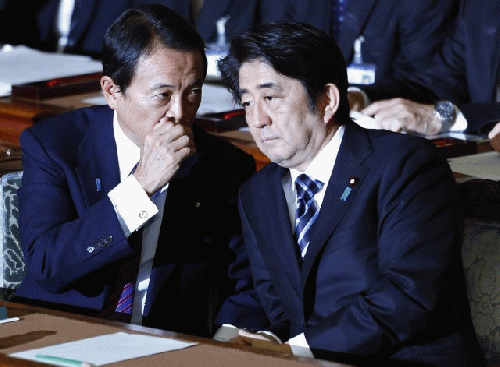
Japanese P.M. Shinzo Abe (R) in parliament as it rejects a no-confidence resolution against his Cabinet.
(Image by REUTERS/Yuya Shino) Details DMCA
The spin in the United States is relentless; this was no less than "saber-rattling," a "bellicose" posture and a unilateral "provocation." The meeting last week between Chinese President Xi Jinping and US Vice-President Joe Biden in Beijing may have done nothing to dispel it.
This is what the White House says Xi and Biden talked about; Beijing did not release a transcript. In the hysteria front, this op-ed in the Financial Times -- reflecting a warped consensus in the City of London -- even managed to crank it up to pre-World War II levels.
Now compare it with the official Chinese media view, from a more conciliatory take in China Daily to a no-holds barred assertion of sovereignty in the in the Global Times.
Which brings us to the scenario that the original provocation may have been actually Japanese, and not Chinese.
Mr Xi, tear down this wall
The whole drama is far from being just about a few islets and rocks that China calls Diaoyu and Japan Senkaku, or the crucial access to the precious waters that surround them, harboring untold riches in oil and natural gas; it concerns no less than the future of China as a sea power rivaling the US.
Let's start with the facts on the sea. Meiji-era documents prove without a doubt that the Japanese government not only admitted that these islands were Chinese (since at least the 16th century) but was also plotting to grab them; that's exactly what happened in 1895, during the first Sino-Japanese war, a historical juncture when China was extremely vulnerable.
After the Japanese occupation of China and World War II, Washington was in control of the territory. A document signed by the Japanese promised the return of the islands to China after the war. It was never fulfilled. In 1972, the US handed over their "administration" to Japan -- but without pronouncing itself about who owned them. A gentlemen's agreement between Chinese premier Zhou Enlai and Japanese prime minister Kakuei Tanaka was also in effect. It was also ignored.
Tokyo ended up buying the islands from a private landowner, the Kurihara family, nationalizing them in September 2012 only a day after a summit between then Chinese President Hu Jintao and PM Yoshihiko Noda, and this after Hu had told Noda not to change the status quo.
Recently, to make matters worse, the Obama administration issued yet one more of its absurd "red lines," affirming it would support Japan in the event of a war revolving around the islands.
Geostrategically, it's even more complex. Virtually all of China's sea trade flows through choke points whose borders are either controlled by close US allies or nations that are not exactly allied with China.
Imagine yourself as a Chinese naval strategist. You look at the seascapes around you and all you see is what strategists call the First Island Chain. That virtual arc goes from Japan and the Ryukyu islands and the Korean peninsula, in the north, moving southwards via Taiwan, Philippines and Indonesia towards Australia. It's your ultimate nightmare. Assuming any serious confrontation along this arc, the US Navy will be able to move its aircraft carriers around and seriously compromise China's access to its oil transported via the straits of Malacca.
Territorial disputes are the norm in the East and South China Seas. In the East China Sea the focus is on the Diaoyu/Senkaku. In the South China Sea it's the Spratly Islands (China opposed to Taiwan, the Philippines and Vietnam) and the Paracel islands (China opposed to Vietnam). Not to mention other disputes now on the backburner with Malaysia and Brunei.
So from the point of view of our Chinese naval strategist, what is deployed is a sort of Reverse Great Wall, an expression, by the way, immensely popular in circles such as the US Naval War College. It's like an invisible sea wall from Japan to Australia that can in theory block China's access to the Pacific.
And if -- and that's a major, long-term if -- there ever would be a US blockade, with its sea trade lanes closed, the Chinese economy would be in tremendous trouble.
They know it in Beijing, and they are wiling to do anything to prevent it.
In search of good PR
What Biden, not to mention US corporate media, is not telling world public opinion is how, for Washington, this has a lot to do with Okinawa -- the key hub from which the US is capable of projecting power west of Japan. It's as if Okinawa was the US's Hadrian's wall.
(Note: You can view every article as one long page if you sign up as an Advocate Member, or higher).





